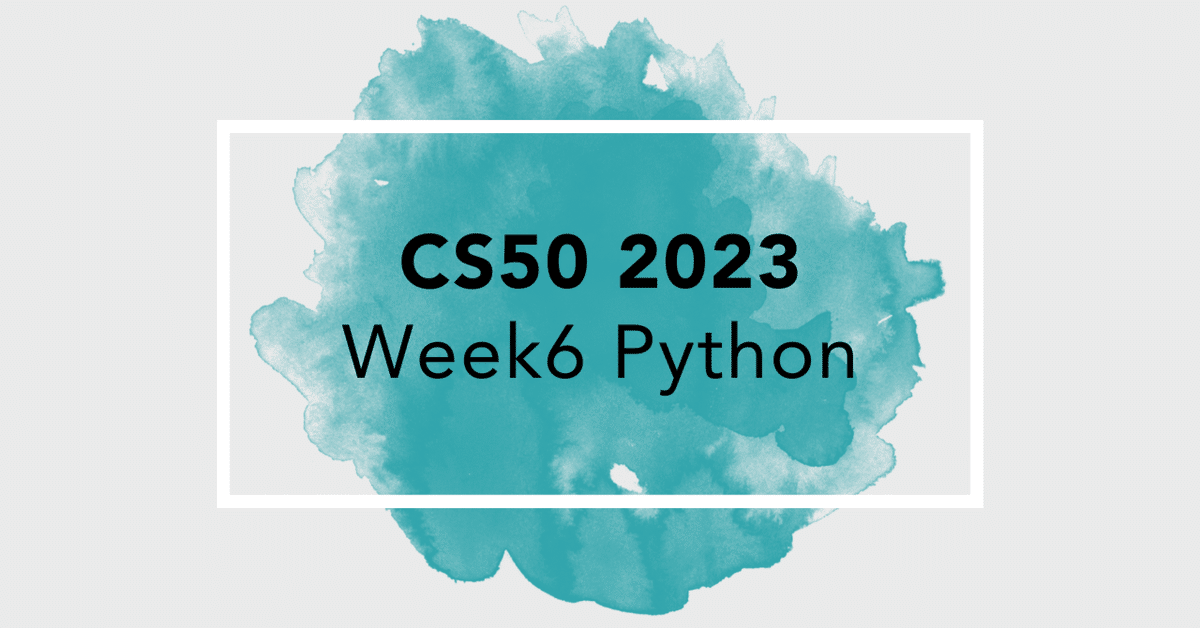
CS50 2023 - Week6 Python
概要
Week6では、Pythonについて学びます。
講義の主な内容は、関数、引数、戻り値、変数、ブール式、条件分岐、ループ、モジュール、そしてパッケージです。
5週にわたり学び続けたC言語を離れ、Pythonの学習が始まります。
しかし、それに伴いWeek6はProblem Setの数が増えているため、本ページではこれまで以上にコード例に焦点を絞って記していきます。
Lab 6
World Cup
ワールドカップでどの国が勝利するかを予測するシミュレーションプログラムを作成します。
以下は実際に渡しが提出したコードです。
tournament.py
# Simulate a sports tournament
import csv
import sys
import random
# Number of simluations to run
N = 1000
def main():
# Ensure correct usage
if len(sys.argv) != 2:
sys.exit("Usage: python tournament.py FILENAME")
teams = []
# TODO: Read teams into memory from file
with open(sys.argv[1], "r") as file:
reader = csv.DictReader(file)
for row in reader:
teams.append({"team": row["team"], "rating": int(row["rating"])})
counts = {}
# TODO: Simulate N tournaments and keep track of win counts
for i in range(N):
winner = simulate_tournament(teams)
if winner in counts:
counts[winner] += 1
else:
counts[winner] = 1
# Print each team's chances of winning, according to simulation
for team in sorted(counts, key=lambda team: counts[team], reverse=True):
print(f"{team}: {counts[team] * 100 / N:.1f}% chance of winning")
def simulate_game(team1, team2):
"""Simulate a game. Return True if team1 wins, False otherwise."""
rating1 = team1["rating"]
rating2 = team2["rating"]
probability = 1 / (1 + 10 ** ((rating2 - rating1) / 600))
return random.random() < probability
def simulate_round(teams):
"""Simulate a round. Return a list of winning teams."""
winners = []
# Simulate games for all pairs of teams
for i in range(0, len(teams), 2):
if simulate_game(teams[i], teams[i + 1]):
winners.append(teams[i])
else:
winners.append(teams[i + 1])
return winners
def simulate_tournament(teams):
"""Simulate a tournament. Return name of winning team."""
# TODO
while len(teams) > 1:
teams = simulate_round(teams)
return teams[0]["team"]
if __name__ == "__main__":
main()
answers.txt
Times:
10 simulations: 0m0.028s
100 simulations: 0m0.030s
1000 simulations: 0m0.050s
10000 simulations: 0m0.104s
100000 simulations: 0m0.731s
1000000 simulations: 0m7.958s
Questions:
Which predictions, if any, proved incorrect as you increased the number of simulations?: TODO
With a small number of simulations, randomness cannot be eliminated,
and three teams are selected at random from the highly rated teams.
Suppose you're charged a fee for each second of compute time your program uses.
After how many simulations would you call the predictions "good enough"?: TODO
It seems like the predictions stabilized after about 1000 simulationsProblem Set 6
これまでC言語で提出してきた課題のいくつかをPythonで再び作成します。これらの課題名には、Sentimentalという接頭語が付きます。
Week1のHello、Mario、CashまたはCreditが選出されています。そして、Week2からはReadabilityが加わります。
Week1の時と同じく、Marioはless comfortableとmore comfortableから選べます。CashとCreditはどちらか一方だけの提出となります。
ここでは、Mario (less comfortable)とCashのコード例を示します。
Sentimental / Hello
# TODO
answer = input("What's your name? ")
print(f"hello, {answer}")Sentimental / Mario (Less)
# TODO
from cs50 import get_int
# Prompt the user for the height until a valid input is entered
while True:
h = get_int("Height: ")
if h >= 1 and h <= 8:
break
# For each row in the height of the pyramid
for i in range(h):
print(" " * (h - 1 - i), end="")
print("#" * (i + 1))
Sentimental / Cash
# TODO
from cs50 import get_float
def get_change():
while True:
x = get_float("Change owed: ")
if x >= 0:
return int(x * 100)
def calculate_coins(cents):
coins = 0
# Calculate the number of quarters to give the customer
coins += cents // 25
cents %= 25
# Calculate the number of dimes to give the customer
coins += cents // 10
cents %= 10
# Calculate the number of nickels to give the customer
coins += cents // 5
cents %= 5
# Calculate the number of pennies to give the customer
coins += cents
return coins
def main():
# Ask how much change the customer is wed
cents = get_change()
coins = calculate_coins(cents)
print(coins)
main()
Sentimental / Readability
# TODO
from cs50 import get_string
import re
import math
# Prompt for user input
text = get_string("Text: ")
# String length
i = len(text)
letters = 0
# Initialize words to 1
words = 1
sentences = 0
# Loop for counting
for x in range(i):
# Letter counting
c = text[x]
if c.isalpha():
letters += 1
# Word counting
if c == " ":
words += 1
# Sentence counting
if c in [".", "!", "?"]:
sentences += 1
# Calculation
L = (letters / words) * 100
s = (sentences / words) * 100
subindex = 0.0588 * L - 0.296 * s - 15.8
index = round(subindex)
if index > 16:
print("Grade 16+")
elif index < 1:
print("Before Grade 1")
else:
print(f"Grade {index}")
DNA
これはWeek6で唯一Sentimentalではない課題となります。
サンプルデータとデータベースを用いて、DNAの持ち主を特定するプログラムを作成します。Lab 5のInheritanceと少し似ていますね。
以下は実際に私が提出したコードです。
import csv
import sys
def main():
# TODO: Check for command-line usage
if len(sys.argv) != 3:
print("Usage: python dna.py data.csv sequence.txt")
sys.exit(1)
# TODO: Read database file into a variable
with open(sys.argv[1], "r") as csvfile:
reader = csv.DictReader(csvfile)
dna_data = list(reader)
str_keys = reader.fieldnames[1:]
# TODO: Read DNA sequence file into a variable
with open(sys.argv[2], "r") as seqfile:
sequence = seqfile.read()
# TODO: Find longest match of each STR in DNA sequence
str_counts = {key: longest_match(sequence, key) for key in str_keys}
# TODO: Check database for matching profiles
for dna in dna_data:
if all(int(dna[key]) == str_counts[key] for key in str_keys):
print(dna["name"])
break
else:
print("No match")
return
def longest_match(sequence, subsequence):
"""Returns length of longest run of subsequence in sequence."""
# Initialize variables
longest_run = 0
subsequence_length = len(subsequence)
sequence_length = len(sequence)
# Check each character in sequence for most consecutive runs of subsequence
for i in range(sequence_length):
# Initialize count of consecutive runs
count = 0
# Check for a subsequence match in a "substring" (a subset of characters) within sequence
# If a match, move substring to next potential match in sequence
# Continue moving substring and checking for matches until out of consecutive matches
while True:
# Adjust substring start and end
start = i + count * subsequence_length
end = start + subsequence_length
# If there is a match in the substring
if sequence[start:end] == subsequence:
count += 1
# If there is no match in the substring
else:
break
# Update most consecutive matches found
longest_run = max(longest_run, count)
# After checking for runs at each character in seqeuence, return longest run found
return longest_run
main()
さいごに
C言語からPythonへの移行を経て、コードの構造は大幅にシンプルになったように感じます。特にSentimentalのProblem Setを通じて、その変化を実感することができました。非常に良く練られたコース構成です。
余談にはなりますが、Sentimentalという単語の選択もおしゃれで、個人的にはとても好きです。
この記事が気に入ったらサポートをしてみませんか?
